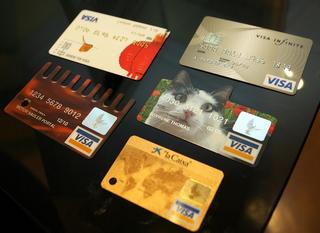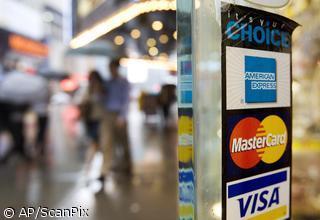JSF project puts virtual reality to its sternest real-world test.
Published:
15 October 1999 y., Friday
Wearing a VR helmet and gloves, MSNBC_s Alan Boyle gestures in front of a screen displaying an image of workers servicing the Joint Strike Fighter. Boyle_s virtual hand appears in the scene.
The high-tech warplane looms silently within a hangar. Two bombs lie on a cart, ready for loading. An olive-clad crewmate approaches me, but something seems wrong: His feet aren_t moving. Is this a dream? No, it_s reality ... virtual reality. I_m wearing a VR helmet in Seattle, and my "crewmate" is plugged in from St. Louis. The plane, the hangar, the bombs all exist only in cyberspace.
This is how the world_s next warplane, the Joint Strike Fighter, is being tested even before it_s built. It_s not just a game: Hundreds of billions of dollars are at stake for the twin giants of America_s aerospace industry. My encounter with the JSF was at the Boeing Co._s virtual reality lab in Seattle - with a cameo appearance by a Boeing technician in St. Louis. But Boeing_s rival for the JSF contract, Lockheed Martin, has established a similar setup in Fort Worth, Texas. Both companies hope that the skillful use of virtual reality - for development and testing of their prototypes as well as for training the future jet_s operators and maintainers - will give them an edge when the Pentagon names the winner of the competition in 2001. The JSF is being designed to serve as the strike fighter for the U.S. Air Force, Navy and Marines, as well as Britain_s Royal Navy and Air Force. Three configurations of the JSF would replace whole ranks of models - F-16 Falcon fighters as well as A-10 Warthog assault planes, Harrier jump jets as well as F-18 Hornets on aircraft carriers.
Copying, publishing, announcing any information from the News.lt portal without written permission of News.lt editorial office is prohibited.
The most popular articles
Software company announced new structure_ of it_s business.
more »
 The iPhone's new “ATM Hunter” is a a free iPhone application built by MasterCard that allows users to quickly find the ATMs that are closest to them.
more »
The iPhone's new “ATM Hunter” is a a free iPhone application built by MasterCard that allows users to quickly find the ATMs that are closest to them.
more »
 In security breach cases last year, such as Hannaford Bros. supermarket and the card processing firm Heartland Payment Systems, cybercriminals gained access to millions of consumers' credit card details.
more »
In security breach cases last year, such as Hannaford Bros. supermarket and the card processing firm Heartland Payment Systems, cybercriminals gained access to millions of consumers' credit card details.
more »
 Ingenico, a provider of payment solutions, says contactless technology will split the retail market this year, improving sales figures for early adopters and costing those who shun the additional investment in this burgeoning technology.
more »
Ingenico, a provider of payment solutions, says contactless technology will split the retail market this year, improving sales figures for early adopters and costing those who shun the additional investment in this burgeoning technology.
more »
 Widevine Technologies today announced that the US Patent and Trademark Office has reconfirmed the validity of many claims of Widevine's U.S.
more »
Widevine Technologies today announced that the US Patent and Trademark Office has reconfirmed the validity of many claims of Widevine's U.S.
more »
 Nokia Corp., the world's largest maker of cell phones, is making a large investment in California-based Obopay Inc., a startup that's pushing person-to-person mobile-payments technology.
more »
Nokia Corp., the world's largest maker of cell phones, is making a large investment in California-based Obopay Inc., a startup that's pushing person-to-person mobile-payments technology.
more »
 The increasing amount of overlap and duplication of data, tasks and processes in their anti-fraud and anti-money laundering divisions is driving banks to seek synergies between compliance, risk management and security, according to a new report from Datamonitor.
more »
The increasing amount of overlap and duplication of data, tasks and processes in their anti-fraud and anti-money laundering divisions is driving banks to seek synergies between compliance, risk management and security, according to a new report from Datamonitor.
more »
 The total number of IPTV subscribers worldwide passed the 20mn mark at the end of 2008, according to new figures from Informa Telecoms & Media, taking into account both disclosed and estimated figures.
more »
The total number of IPTV subscribers worldwide passed the 20mn mark at the end of 2008, according to new figures from Informa Telecoms & Media, taking into account both disclosed and estimated figures.
more »
 The IPTV World Forum opened its doors this morning on a bright London day, and the mood was equally optimistic indoors, with the conference rooms packed for keynote presentations from Christopher Schläffer of Deutsche Telekom, Christophe Forax from the European Commission and the BBC's Richard Halton, charged with making Project Canvas a reality.
more »
The IPTV World Forum opened its doors this morning on a bright London day, and the mood was equally optimistic indoors, with the conference rooms packed for keynote presentations from Christopher Schläffer of Deutsche Telekom, Christophe Forax from the European Commission and the BBC's Richard Halton, charged with making Project Canvas a reality.
more »
 A new Gartner Inc. report suggests that financial fraud could drive consumers away from banks and into the arms of electronic payment systems, such as PayPal, that they perceive to be more secure.
more »
A new Gartner Inc. report suggests that financial fraud could drive consumers away from banks and into the arms of electronic payment systems, such as PayPal, that they perceive to be more secure.
more »
 In the last year this more than doubles the number of cards and devices in circulation around the world.
more »
In the last year this more than doubles the number of cards and devices in circulation around the world.
more »